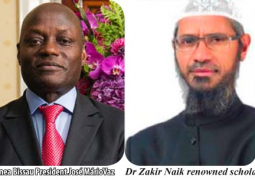We are today calling for help and more support for disabled persons.
These people do encounter many challenges in society, and are often subjected to stigma and discrimination.
This important segment of our society remains largely marginalized.
It comprises of people who are disproportionately poorer, frequently unemployed and have higher rates of mortality.
Furthermore, they are largely excluded from civil and political processes, and are overwhelmingly voiceless in matters that affect their lives and their society.
We believe that when persons with disabilities are empowered to participate and lead the process of development, it would pay dividends for themselves, their families and the country as a whole.
There is no doubt that the problems facing disabled people in this country are huge, and are militating against their performance and productivity.
Their problems call for the concerted efforts to sensitize government and enlighten the populace on the need to create a conducive atmosphere for social, economic and political integration of the disabled persons.
Today, it is a common knowledge that in our society, people with disabilities are excluded from the mainstream, and experience severe difficulties in accessing fundamental rights.
In some communities, disabled persons are rejected or abandoned. They are often viewed as unproductive and even useless.
The reality is that one can become disabled at any time, hence the need for a concerted effort, among all stakeholders, to ensure that the burden of people living with disabilities is narrowed.
Mainstreaming disability in our development programmes could be an ideal strategy for achieving equality for persons with disabilities.

